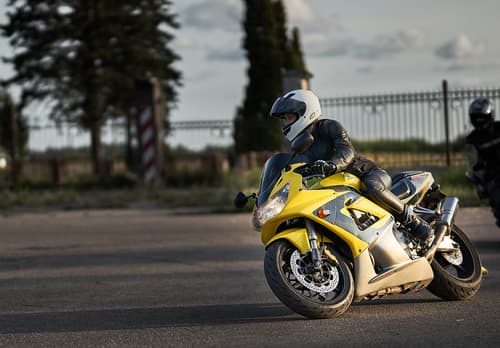
Motorcycle riders in Ohio have the freedom to choose whether to wear a helmet—at least in most cases. Unlike some states with universal helmet laws, Ohio only requires certain riders to wear protective headgear. However, choosing not to wear a helmet could have legal and financial implications after a motorcycle accident.
You need to understand Ohio motorcycle helmet laws for both safety and legal protection. If you were involved in a motorcycle crash, the presence or absence of a helmet might play a role in your ability to recover compensation. If another driver or some other factor beyond your control caused the crash, an experienced motorcycle accident attorney can explain your rights and help you pursue a fair settlement.
Do You Have to Wear a Motorcycle Helmet in Ohio?
Ohio law does not require most adult motorcyclists to wear a helmet. However, under Ohio Revised Code § 4511.53(C)(1), helmets are mandatory for:
- Riders Under 18: Any motorcyclist under the age of 18 must wear a helmet, regardless of their experience level.
- Novice Riders: A novice license is issued to anyone who has held their motorcycle license for less than one year. During this period, they must wear a helmet while operating a motorcycle.
- Passengers on Certain Motorcycles: If a rider is legally required to wear a helmet, any passenger on their motorcycle must also wear one—even if the passenger is an experienced, licensed rider.
Additionally, while Ohio does not require eye protection for riders, motorcyclists must wear protective eyewear unless their bike has a windscreen. This is a separate but related law that all riders should be aware of.
Recent and Potential Changes to Ohio Helmet Laws
Motorcycle safety laws can change, especially as lawmakers evaluate crash data and safety statistics. While Ohio helmet laws have remained consistent in recent years, legislative efforts occasionally aim to expand or adjust helmet regulations.
For example:
- Some lawmakers have proposed stricter helmet laws to improve road safety and reduce serious injuries in crashes.
- There have been discussions about incentive programs that would encourage helmet use, such as potential insurance discounts for riders who wear helmets.
- If federal regulations change regarding helmet safety standards, Ohio may adjust its helmet law to comply with new guidelines.
Riders should stay informed about Ohio motorcycle helmet laws to ensure they remain compliant and avoid fines or penalties. Checking with the Ohio Bureau of Motor Vehicles (BMV) or consulting a motorcycle accident attorney can help clarify any recent legal updates.
Even though helmets are not legally required for most adults in Ohio, wearing one significantly reduces the risk of severe head injuries. Helmets can also play a role in how an insurance company or court evaluates a personal injury claim after an accident.
How Ohio Helmet Laws Affect Motorcycle Accident Claims

Motorcyclists in Ohio have the same legal rights as other drivers when it comes to seeking compensation after an accident. However, not wearing a helmet could impact an injury claim, depending on the type of injuries sustained and the arguments made by the at-fault party or insurance companies.
Comparative Negligence and Helmet Use
Ohio follows a modified comparative negligence rule when determining liability in personal injury cases. This means that if you are found partially responsible for your injuries, your compensation may be reduced based on your percentage of fault.
Even though Ohio helmet laws do not require most adult riders to wear a helmet, insurance companies and defense attorneys may argue that choosing not to wear one contributed to the severity of head injuries. If a court agrees, your settlement or award could be reduced. However, if the accident resulted in injuries unrelated to the head—such as broken bones or spinal damage—the lack of a helmet may have little to no effect on your compensation.
Insurance Companies Use Helmet Laws to Reduce Payouts
Insurance companies often look for ways to limit their financial responsibility after a motorcycle accident. If you were not wearing a helmet, an insurer may argue that you were partially at fault for your injuries, even if the Ohio motorcycle helmet law did not require you to wear one.
Common insurance tactics include:
- Claiming that a head injury could have been prevented or reduced if a helmet had been worn.
- Arguing that not wearing a helmet shows reckless behavior, which could influence a jury’s perception of the case.
- Attempting to deny coverage or reduce settlement offers by citing comparative negligence laws.
How a Lawyer Can Protect Your Claim
Even if you were not wearing a helmet, you still have the right to seek full compensation for your medical expenses, lost income, pain and suffering, and other damages. A motorcycle accident attorney can:
- Prove that another driver’s negligence caused the crash, regardless of helmet use.
- Challenge unfair blame from the insurance company or opposing legal team.
- Use expert testimony and medical evidence to show that the injuries resulted from the collision, not the absence of a helmet.
While wearing a helmet may strengthen your claim, not wearing one does not automatically mean you lose your right to compensation. If another driver was responsible for the crash, they should be held accountable for your injuries.
Common Injuries in Ohio Motorcycle Accidents
Motorcycle crashes often result in severe injuries due to the lack of structural protection that cars and trucks provide. Even when riders take precautions like wearing protective gear, they remain vulnerable to serious harm. Some of the most common injuries in Ohio motorcycle accidents include:
Traumatic Brain Injuries (TBIs)

Head injuries are among the most severe consequences of motorcycle crashes. Without a helmet, riders face a significantly higher risk of traumatic brain injuries (TBIs), which can lead to permanent cognitive impairment, memory loss, and even fatal outcomes. Although Ohio motorcycle helmet laws do not require most adult riders to wear a helmet, medical studies show that helmets reduce the likelihood of severe brain injuries by 67% and lower the risk of death by 37%.
Spinal Cord Injuries
The force of a motorcycle crash can cause damage to the spinal cord, potentially leading to partial or complete paralysis. Injuries such as herniated discs, fractured vertebrae, or nerve damage may result in lifelong mobility challenges, chronic pain, and costly medical treatments. While helmets do not prevent spinal injuries, they may reduce the risk of associated head trauma, which often occurs in severe crashes.
Broken Bones and Fractures
Motorcyclists frequently suffer broken bones when they are thrown from their bike or hit by another vehicle. Common fractures include:
- Leg fractures due to the motorcycle falling onto the rider
- Arm and wrist fractures from instinctively trying to break a fall
- Rib fractures from impact with the road or another vehicle
While broken bones often heal with medical treatment, some fractures require surgery, physical therapy, or long-term rehabilitation.
Road Rash and Soft Tissue Injuries
When a motorcyclist slides across the pavement, the friction causes road rash, which can range from mild scrapes to deep wounds that damage muscle and nerve tissue. Severe cases may require skin grafts and leave permanent scarring. Protective gear, including long sleeves, gloves, and padded riding pants, can help prevent these injuries, but helmets remain the most effective way to prevent life-threatening head trauma.
Internal Injuries and Organ Damage
Blunt force trauma from a motorcycle accident can cause internal bleeding and damage to vital organs. These injuries are particularly dangerous because symptoms may not appear immediately, delaying necessary medical treatment. Internal injuries often require emergency surgery and can be fatal if left untreated.
How Helmets Help Reduce Severe Injuries
While Ohio helmet laws do not require most adult riders to wear helmets, doing so greatly reduces the risk of fatal head injuries. Helmets act as a barrier, absorbing the impact of a crash and reducing the chances of skull fractures or TBIs. Even though riders have the freedom to decide whether to wear one, helmets remain one of the most effective ways to prevent life-altering injuries in a motorcycle accident.
Importance of Other Safety Gear When Riding Motorcycles

While Ohio helmet laws focus on head protection, helmets are just one piece of essential motorcycle safety gear. Riders who wear the right protective equipment significantly reduce their risk of serious injuries in a crash. Even though Ohio law does not mandate most safety gear beyond helmets for certain riders, investing in high-quality protective equipment can prevent severe injuries and even save lives.
Protective Eyewear: Required by Law
As mentioned, Ohio law requires all motorcycle riders to wear protective eyewear unless their bike is equipped with a windscreen. Goggles, face shields, or riding glasses protect against debris, wind, and insects that could impair vision and lead to an accident.
Riding Jackets and Pants: Protection Against Road Rash
In a crash, exposed skin can suffer severe abrasions, lacerations, and burns. Motorcycle-specific jackets and pants—made from reinforced materials like leather, Kevlar, or textile armor—help protect riders from road rash, cuts, and impact injuries. Many modern riding jackets also include built-in padding or armor to absorb the force of a crash.
Gloves: Grip and Hand Protection
Many riders instinctively put their hands out to break a fall, leading to fractured wrists, sprained fingers, or deep abrasions. Motorcycle gloves provide a firm grip on the handlebars while protecting the hands from injuries in case of an accident.
Riding Boots: Foot and Ankle Support
Standard sneakers or casual shoes offer little protection on a motorcycle. Riding boots provide ankle support, slip resistance, and reinforced toe protection to prevent injuries from impact or crushing forces. Without sturdy footwear, riders risk severe fractures, burns, or even foot amputation in high-impact crashes.
Reflective and High-Visibility Gear: Increasing Rider Visibility
One of the leading causes of motorcycle accidents is other drivers failing to see the rider. High-visibility jackets, reflective tape, and brightly colored helmets help increase visibility, reducing the likelihood of being hit by a distracted or negligent driver—especially at night or in poor weather conditions.
Steps to Take After a Motorcycle Accident in Ohio
Taking the right steps immediately after a crash can protect your health, your legal rights, and your ability to seek compensation. If you’ve been injured in an accident, follow these steps to ensure your safety and build a strong case.
1. Get to Safety and Call 911
Your first priority after a motorcycle accident is your safety. If possible, move yourself and your bike out of traffic to avoid further harm. Call 911 right away to report the accident and request emergency medical assistance if needed. Even if injuries seem minor, having law enforcement at the scene ensures an official accident report is filed, which can be valuable evidence later.
2. Seek Immediate Medical Attention
Motorcycle accidents often cause serious injuries, including traumatic brain injuries, spinal cord damage, and internal bleeding. Some injuries may not be immediately visible, so you must get checked by a doctor as soon as possible. Medical records provide crucial documentation linking your injuries to the accident, which can be key in securing compensation.
3. Document the Scene and Gather Evidence
If you’re physically able, collect as much evidence as possible at the crash site. Important information includes:
Photos and videos of the accident scene, including vehicle damage, skid marks, traffic signs, and road conditions.
Your injuries, documenting their severity at the time of the accident.
Driver and witness information, including names, contact details, and insurance information.
Police report details, such as the responding officer’s name and badge number.
4. Avoid Admitting Fault or Discussing the Accident
Even if you feel shaken up, do not apologize or admit fault at the scene, as this could be used against you later. Stick to the facts when speaking with law enforcement and avoid discussing the accident with the other driver’s insurance company until you’ve consulted a lawyer.
5. Notify Your Insurance Company
Report the accident to your insurance provider as soon as possible. Be honest but cautious about what you say, as insurers may try to minimize or deny your claim. You are not obligated to provide a recorded statement to the at-fault driver’s insurance company.
6. Contact a Motorcycle Accident Lawyer
Navigating a motorcycle accident claim requires experienced legal representation, especially when insurance companies attempt to shift blame or downplay your injuries. A lawyer can:
- Protect your rights and handle communication with insurers.
- Gather medical and accident evidence to support your claim.
- Fight for full compensation for medical expenses, lost wages, and pain and suffering.
If you’ve been involved in a motorcycle accident in Ohio, securing legal representation early can make a significant difference in your case outcome.
Speak With a Columbus Motorcycle Accident Lawyer Today

Ohio gives riders the freedom to decide whether to wear a helmet, but after an accident, that choice could influence your injury claim. If you were hurt in a motorcycle crash—whether you were wearing a helmet or not—our legal team can help you fight for the compensation you deserve.
Contact O’Connor, Acciani & Levy today for a free consultation. Let us handle the legal process while you focus on healing.